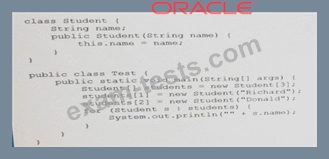Question 81
Given:

What is the result?

What is the result?
Question 82
Given:
class Vehicle {
int vno;
String name;
public Vehicle (int vno, String name) {
this.vno = vno,;
this.name = name;
}
public String toString () {
return vno + ":" + name;
}
}
and this code fragment:
Set<Vehicle> vehicles = new TreeSet <> ();
vehicles.add(new Vehicle (10123, "Ford"));
vehicles.add(new Vehicle (10124, "BMW"));
System.out.println(vehicles);
What is the result?
class Vehicle {
int vno;
String name;
public Vehicle (int vno, String name) {
this.vno = vno,;
this.name = name;
}
public String toString () {
return vno + ":" + name;
}
}
and this code fragment:
Set<Vehicle> vehicles = new TreeSet <> ();
vehicles.add(new Vehicle (10123, "Ford"));
vehicles.add(new Vehicle (10124, "BMW"));
System.out.println(vehicles);
What is the result?
Question 83
Given:

and

Which interface from the java.util.functionpackage should you use to refactor the class Txt?

and

Which interface from the java.util.functionpackage should you use to refactor the class Txt?
Question 84
Given the code fragment:
BiFunction<Integer, Double, Integer> val = (t1, t2) -> t1 + t2; //line n1
System.out.println(val.apply(10, 10.5));
What is the result?
BiFunction<Integer, Double, Integer> val = (t1, t2) -> t1 + t2; //line n1
System.out.println(val.apply(10, 10.5));
What is the result?
Question 85
Given the code fragment:

You have been asked to define the ProductCode class. The definition of the ProductCode class must allow c1 instantiation to succeed and cause a compilation error on c2 instantiation.
Which definition of ProductCode meets the requirement?

You have been asked to define the ProductCode class. The definition of the ProductCode class must allow c1 instantiation to succeed and cause a compilation error on c2 instantiation.
Which definition of ProductCode meets the requirement?

